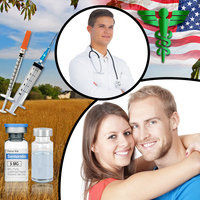Introduction to Testosterone Replacement Therapy
Testosterone Replacement Therapy (TRT) has become a pivotal treatment option for men experiencing the effects of low testosterone levels, a condition known as hypogonadism. As American men increasingly seek solutions to enhance their quality of life, understanding the intricacies of TRT and interpreting lab results becomes crucial. This article aims to demystify the process and outcomes of TRT, focusing on the interpretation of lab results to guide American men through their therapeutic journey.
The Role of Testosterone in Men's Health
Testosterone, the primary male sex hormone, plays a vital role in regulating various bodily functions, including muscle mass, bone density, fat distribution, red blood cell production, and sexual and reproductive function. As men age, testosterone levels naturally decline, which can lead to symptoms such as decreased libido, fatigue, depression, and reduced muscle mass. TRT aims to restore testosterone levels to a normal range, thereby alleviating these symptoms and improving overall well-being.
Understanding Lab Results in TRT
When embarking on TRT, regular monitoring through blood tests is essential to assess the therapy's effectiveness and safety. Key lab results to monitor include total testosterone, free testosterone, sex hormone-binding globulin (SHBG), and hematocrit levels.
- **Total Testosterone**: This measures the overall amount of testosterone in the blood. The normal range for adult males is typically between 300 to 1,000 ng/dL. TRT aims to maintain levels within this range.
- **Free Testosterone**: This represents the portion of testosterone that is not bound to proteins and is available for use by the body. While less commonly measured, it can provide additional insight into the effectiveness of TRT.
- **Sex Hormone-Binding Globulin (SHBG)**: SHBG binds to testosterone, reducing the amount of free testosterone. Monitoring SHBG levels can help adjust TRT dosages to ensure optimal free testosterone levels.
- **Hematocrit**: TRT can increase red blood cell production, potentially leading to a higher hematocrit level. Elevated levels can increase the risk of blood clots, necessitating regular monitoring and possible adjustments to the therapy.
Interpreting Your Lab Results
Understanding your lab results is crucial for optimizing TRT. If total testosterone levels are below the normal range despite therapy, adjustments in dosage or delivery method may be necessary. Conversely, if levels exceed the upper limit, reducing the dosage or temporarily pausing therapy might be required to prevent side effects such as acne, sleep apnea, or prostate enlargement.
Monitoring free testosterone and SHBG levels can provide a more nuanced view of your hormonal balance. For instance, if SHBG levels are high, more testosterone may be bound, reducing the amount available for use, which might necessitate a higher TRT dosage.
Hematocrit levels should be closely monitored, as levels above 54% may indicate a need for intervention, such as blood donation or a change in TRT regimen.
The Importance of Regular Monitoring
Regular follow-up appointments and blood tests are essential components of successful TRT. These check-ins allow healthcare providers to adjust treatment plans based on your body's response, ensuring the therapy remains safe and effective. American men on TRT should work closely with their healthcare providers to interpret lab results and make informed decisions about their treatment.
Conclusion
Testosterone Replacement Therapy offers a promising solution for American men dealing with the effects of low testosterone. By understanding and interpreting lab results, men can actively participate in their treatment, ensuring that TRT is both safe and effective. As with any medical treatment, ongoing communication with healthcare providers is key to achieving the best possible outcomes.
Contact Us For A Fast And Professional Response

- TRT's Impact on Mental Health in American Men: Benefits, Risks, and Holistic Approaches [Last Updated On: March 12th, 2025] [Originally Added On: March 12th, 2025]
- Testosterone Replacement Therapy: Benefits and Risks for Young American Men with Hypogonadism [Last Updated On: March 18th, 2025] [Originally Added On: March 18th, 2025]
- Optimizing Testosterone Replacement Therapy with Diet and Exercise: A Holistic Approach for American Men [Last Updated On: March 18th, 2025] [Originally Added On: March 18th, 2025]
- TRT Boosts Bone Health in American Males: Benefits and Considerations [Last Updated On: March 18th, 2025] [Originally Added On: March 18th, 2025]
- American Men's Experiences with Testosterone Replacement Therapy: Impacts and Insights [Last Updated On: March 18th, 2025] [Originally Added On: March 18th, 2025]
- Navigating Insurance Coverage for Testosterone Replacement Therapy: A Comprehensive Guide [Last Updated On: March 19th, 2025] [Originally Added On: March 19th, 2025]
- Testosterone Replacement Therapy: Dosage, Methods, and Risks for American Males [Last Updated On: March 19th, 2025] [Originally Added On: March 19th, 2025]
- Testosterone Replacement Therapy: Enhancing Male Health and Vitality in American Men [Last Updated On: March 19th, 2025] [Originally Added On: March 19th, 2025]
- TRT: Benefits, Risks, and Prostate Health Monitoring in American Men [Last Updated On: March 19th, 2025] [Originally Added On: March 19th, 2025]
- Future of TRT: Innovations, Personalization, and Accessibility in American Medicine [Last Updated On: March 20th, 2025] [Originally Added On: March 20th, 2025]
- Economic Impact of Testosterone Replacement Therapy on U.S. Healthcare System [Last Updated On: March 20th, 2025] [Originally Added On: March 20th, 2025]
- TRT and Holistic Health: Enhancing American Men's Wellness with Alternative Therapies [Last Updated On: March 21st, 2025] [Originally Added On: March 21st, 2025]
- TRT in American Men: Masculinity, Stigma, and Healthcare Dynamics [Last Updated On: March 21st, 2025] [Originally Added On: March 21st, 2025]
- TRT Enhances Sleep Quality in American Males with Low Testosterone [Last Updated On: March 21st, 2025] [Originally Added On: March 21st, 2025]
- Testosterone Replacement Therapy: Enhancing Mood in American Males [Last Updated On: March 22nd, 2025] [Originally Added On: March 22nd, 2025]
- TRT: Enhancing Weight Management in American Males Through Holistic Approach [Last Updated On: March 22nd, 2025] [Originally Added On: March 22nd, 2025]
- Hypogonadism and TRT: Benefits, Risks, and Lifestyle Impact on American Males [Last Updated On: March 23rd, 2025] [Originally Added On: March 23rd, 2025]
- TRT's Impact on Immune Function in American Men: Benefits and Risks [Last Updated On: March 23rd, 2025] [Originally Added On: March 23rd, 2025]
- TRT's Role in Managing Diabetes: Insights for American Men [Last Updated On: March 23rd, 2025] [Originally Added On: March 23rd, 2025]
- TRT Benefits for American Males: Enhancing Skin Health and Elasticity [Last Updated On: March 23rd, 2025] [Originally Added On: March 23rd, 2025]
- Managing Side Effects of Testosterone Replacement Therapy in American Males [Last Updated On: March 24th, 2025] [Originally Added On: March 24th, 2025]
- Testosterone Replacement Therapy: Benefits, Risks, and Management for Aging Males [Last Updated On: March 24th, 2025] [Originally Added On: March 24th, 2025]
- Testosterone Replacement Therapy: Enhancing Muscle Mass in American Men [Last Updated On: March 24th, 2025] [Originally Added On: March 24th, 2025]
- TRT's Potential to Enhance Cognitive Function in American Men: An Overview [Last Updated On: March 24th, 2025] [Originally Added On: March 24th, 2025]
- TRT: Benefits for American Males and Its Impact on Vision Health [Last Updated On: March 24th, 2025] [Originally Added On: March 24th, 2025]
- Testosterone Replacement Therapy: Monitoring, Adjusting, and Lifestyle for American Males [Last Updated On: March 24th, 2025] [Originally Added On: March 24th, 2025]
- Testosterone Replacement Therapy: Combating Fatigue in American Men [Last Updated On: March 24th, 2025] [Originally Added On: March 24th, 2025]
- TRT: Enhancing Emotional Well-being in American Men with Low Testosterone [Last Updated On: March 24th, 2025] [Originally Added On: March 24th, 2025]
- TRT's Impact on Cardiovascular Health in American Men: Benefits and Risks [Last Updated On: March 24th, 2025] [Originally Added On: March 24th, 2025]
- TRT's Impact on Male Fertility: Risks, Strategies, and Lifestyle Considerations [Last Updated On: March 24th, 2025] [Originally Added On: March 24th, 2025]
- TRT and Hair Loss: Understanding Risks and Management Strategies for American Men [Last Updated On: March 25th, 2025] [Originally Added On: March 25th, 2025]
- TRT's Impact on Digestive Health in American Men: A Comprehensive Overview [Last Updated On: March 25th, 2025] [Originally Added On: March 25th, 2025]
- TRT Benefits for Joint Health in American Males: A Comprehensive Overview [Last Updated On: March 25th, 2025] [Originally Added On: March 25th, 2025]
- TRT Enhances Injury Recovery in American Males: Benefits and Considerations [Last Updated On: March 25th, 2025] [Originally Added On: March 25th, 2025]
- Testosterone Replacement Therapy: Benefits, Risks, and Management for American Men [Last Updated On: March 25th, 2025] [Originally Added On: March 25th, 2025]
- TRT Enhances Cognitive Function and Mental Clarity in American Men [Last Updated On: March 26th, 2025] [Originally Added On: March 26th, 2025]
- TRT: A Promising Approach to Managing Chronic Pain in American Males [Last Updated On: March 26th, 2025] [Originally Added On: March 26th, 2025]
- Testosterone Replacement Therapy: Benefits, Risks, and Latest Research for American Men [Last Updated On: March 26th, 2025] [Originally Added On: March 26th, 2025]
- Testosterone Replacement Therapy: Benefits, Risks, and Management for American Men [Last Updated On: March 26th, 2025] [Originally Added On: March 26th, 2025]
- Testosterone Replacement Therapy: Enhancing Stamina in American Males [Last Updated On: March 26th, 2025] [Originally Added On: March 26th, 2025]
- TRT's Impact on Liver Health: Monitoring and Managing Risks [Last Updated On: March 26th, 2025] [Originally Added On: March 26th, 2025]
- Testosterone Replacement Therapy: Costs, Benefits, and Accessibility for American Men [Last Updated On: March 27th, 2025] [Originally Added On: March 27th, 2025]
- Testosterone Replacement Therapy: A Promising Treatment for Depression in American Males [Last Updated On: March 27th, 2025] [Originally Added On: March 27th, 2025]
- TRT's Potential Benefits for Respiratory Health in American Men: A Comprehensive Overview [Last Updated On: March 27th, 2025] [Originally Added On: March 27th, 2025]
- TRT: A Solution for Low Libido in American Males - Benefits, Safety, and Future [Last Updated On: March 27th, 2025] [Originally Added On: March 27th, 2025]
- TRT and Blood Pressure: Monitoring and Management Strategies for American Men [Last Updated On: March 28th, 2025] [Originally Added On: March 28th, 2025]
- Maximizing TRT Benefits: Diet, Exercise, Sleep, and Stress Management for American Males [Last Updated On: March 29th, 2025] [Originally Added On: March 29th, 2025]
- TRT: Managing Stress and Enhancing Well-being in American Males [Last Updated On: March 29th, 2025] [Originally Added On: March 29th, 2025]
- TRT's Impact on Kidney Function: Benefits and Risks for American Males [Last Updated On: March 29th, 2025] [Originally Added On: March 29th, 2025]
- Testosterone Replacement Therapy: Enhancing Confidence and Well-being in American Males [Last Updated On: March 30th, 2025] [Originally Added On: March 30th, 2025]
- Choosing the Right TRT Clinic: Key Factors for American Males [Last Updated On: March 30th, 2025] [Originally Added On: March 30th, 2025]
- Testosterone Replacement Therapy: Side Effects and Risks for American Men [Last Updated On: March 31st, 2025] [Originally Added On: March 31st, 2025]
- TRT's Complex Effects on Blood Sugar in American Men: A Comprehensive Analysis [Last Updated On: April 1st, 2025] [Originally Added On: April 1st, 2025]
- TRT's Impact on Cholesterol: Insights for American Males on Therapy [Last Updated On: April 1st, 2025] [Originally Added On: April 1st, 2025]
- TRT's Impact on Thyroid Function: Essential Insights for American Men [Last Updated On: April 4th, 2025] [Originally Added On: April 4th, 2025]
- Testosterone Replacement Therapy: Enhancing Health and Vitality in American Males [Last Updated On: April 5th, 2025] [Originally Added On: April 5th, 2025]
- Exploring TRT: Benefits, Risks, and Ethics for American Male Athletes [Last Updated On: April 8th, 2025] [Originally Added On: April 8th, 2025]
- Maximizing Health: Integrating TRT with Lifestyle and Pharmacological Therapies for American Males [Last Updated On: April 8th, 2025] [Originally Added On: April 8th, 2025]
- Understanding Allergic Reactions in Testosterone Replacement Therapy: Risks and Management [Last Updated On: April 9th, 2025] [Originally Added On: April 9th, 2025]
- TRT's Impact on Dental Health: Insights for American Men [Last Updated On: April 9th, 2025] [Originally Added On: April 9th, 2025]
- TRT and Hearing Health: Considerations for American Males [Last Updated On: April 9th, 2025] [Originally Added On: April 9th, 2025]
- TRT: Boosting Social Confidence and Relationships in American Males [Last Updated On: April 9th, 2025] [Originally Added On: April 9th, 2025]
- Traveling with Testosterone Replacement Therapy: A Comprehensive Guide for American Men [Last Updated On: April 10th, 2025] [Originally Added On: April 10th, 2025]
- TRT Benefits for Eye Health in American Men: Dry Eye, AMD, and More [Last Updated On: April 11th, 2025] [Originally Added On: April 11th, 2025]
- TRT's Impact on American Men's Reproductive Health: Fertility and Sperm Production Effects [Last Updated On: April 12th, 2025] [Originally Added On: April 12th, 2025]

















